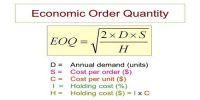Cost allocation is the process of finding a cost of different cost objects such as a project, a department, a branch, a customer, etc. It involves identifying the cost object, identifying and accumulating the costs that are incurred and assigning them to the cost object on some reasonable basis.
There are three broad elements of cost –
(a) Material,
(b) Labor,
(c) Expenses.
They are discussed below –
(A) Material: The substance from which the product is made is known as material. It may be in a raw or a manufactured state. It can be direct as well as indirect.
(i) Direct Material: All material which becomes an integral part of the finished product and which can be conveniently assigned to specific physical units is termed as “Direct Material”.
Following are some of the examples of direct material –
- All material or components specifically purchased produced or requisitioned from stores.
- Primary packing material (e.g. — cartoon, wrapping, cardboard, boxes etc.)
- Purchased or partly produced components.
Direct material is also described as raw-material, process material, prime material, production material, stores material, constructional material etc.
(ii) Indirect Material: All material which is used for purposes ancillary to the business and which cannot be conveniently assigned to specific physical units is termed as “Indirect Material”.
- Consumable stores, oil, and waste, printing, and stationery etc. are a few examples of indirect material.
- Indirect material may be used in the factory the office or the selling and distribution division.
(B) Labor – For conversion of materials into finished goods, human effort is needed such human effort is called labor. Labor can be direct as well as indirect.
(1) Direct labor: Labor which takes an active and direct part in the production of a particular commodity is called labor. Direct labor costs are, therefore specially and conveniently traceable to specific products.
Direct labor is also described as process labor, productive labor, operating labor, manufacturing labor, direct wages etc.
(ii) Indirect labor: Labor employed for the purpose of carrying out tasks incidental to goods or services provided, is indirect labor such labor does not alter the construction, composition or condition of the product. It cannot be practically traced to specific units of output wages of storekeepers, foreman, timekeepers, directors, fees, salaries of salesmen etc. are all examples of indirect labor costs. Indirect labor may relate to the factory the office or the selling and distribution division.
(C) Overheads – It is to be noted that the term overheads has a wider meaning than the term indirect expenses overheads include the cost of indirect material, indirect labor besides indirect expenses. Indirect expenses may be classified under the following three categories –
(i) Manufacturing (works, factory or production) expenses: Such indirect expenses which are incurred in the factory and concerned with the running of the factory or plant are known as manufacturing expense. Expenses related to production management and administrations are included therein. Following are a few items of such expenses: Rent, rates, and insurance of factory premises, a power used in the factory building, plant and machinery etc.
(ii) Office and Administrative expenses: These expenses are not related to the factory but they pertain to the management and administration of business such expenses are incurred in the direction and control of an undertaking example are: office rent, lighting and heating, postage and telegrams, telephones and other charges: depreciation of office building, furniture and equipment, bank charges, legal charges, audit fee etc.
(iii) Selling and Distribution Expenses: Expenses incurred for marketing of a commodity, for securing orders for the articles, dispatching goods sold, and for making efforts to find and retain customers are called selling and distribution expenses examples are:
- Advertisement expenses cost of preparing tenders, traveling expenses, bad debts, collection charges etc.
- Warehouse charges packing and loading charges, carriage outwards, etc.














